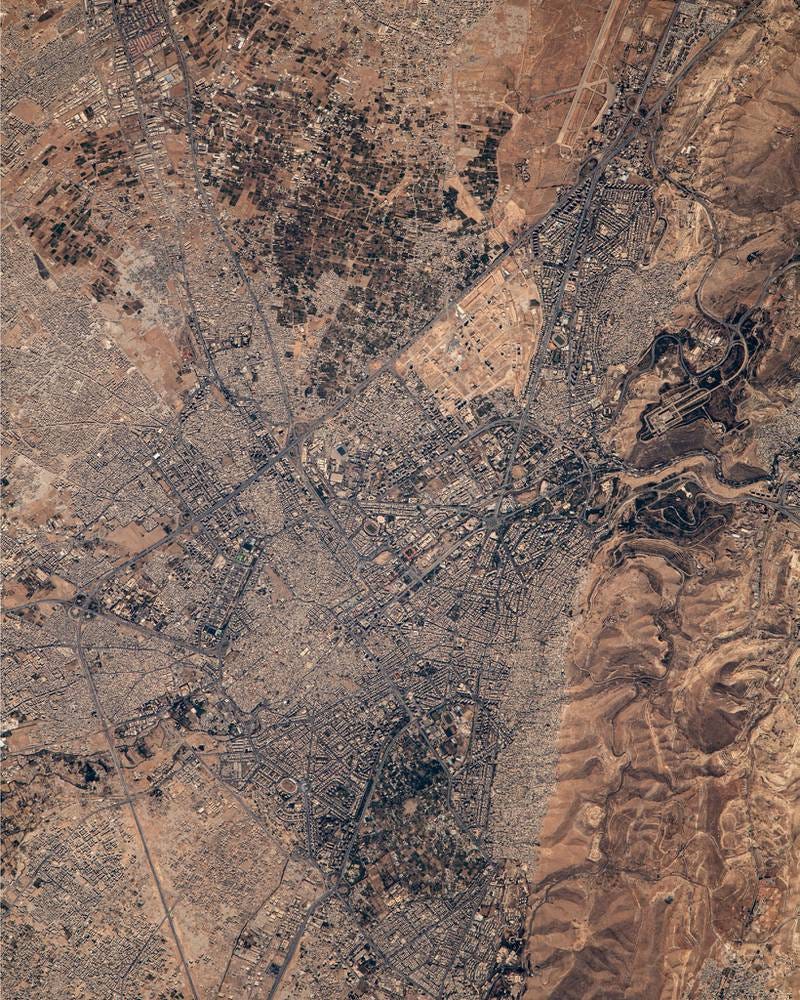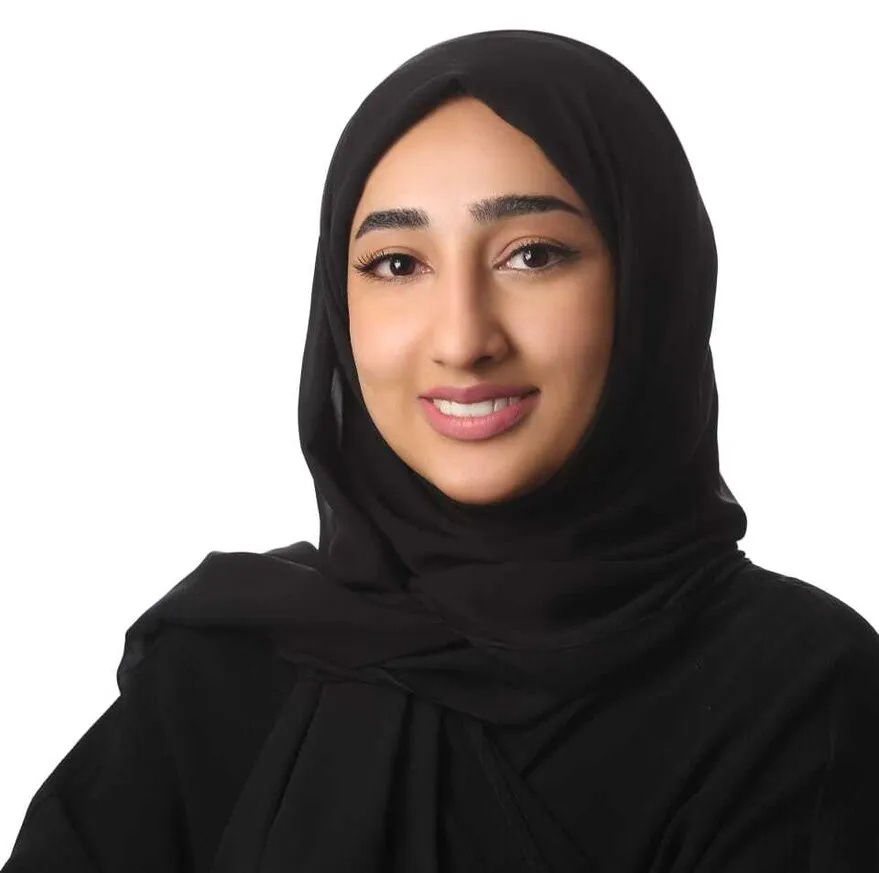Middle East Space Roundup: 30 July to 5 August 2023
A summary of all the space news in the Greater Middle East over the past week, powered by AzurX

The following are the major space developments in the Greater Middle East region tracked by Middle East Space Monitor over the past week:
Senior Military Officer from Qatar Visits U.S. Space Command
U.S. Army Major General Michael Morrisey, the Director of U.S. Space Command's Strategy, Plans, and Policy directorate, recently met with Qatari Major General Abdulaziz Al Doseri, the Advisor to Qatar's Deputy Prime Minister for Defence Affairs for Space and Telecommunications, during a visit to USSPACECOM component command, Joint Task Force-Space Defense's Commercial Operations Cell (JCO) in Colorado Springs, Colorado. The delegation from Qatar had the opportunity to observe one of the JCO's Sprint Advanced Concept Trainings (SACT), which are designed to enhance collaboration between USSPACECOM and its components, allied and partner nation space enterprises, and the commercial space industry.
Delegation from Royal Saudi Air Force Visits U.S. Space Command
U.S. Army General James H. Dickinson, the commander of U.S. Space Command (USSPACECOM), hosted Major General Talal Sulaiman Al Ghamdi, the Royal Saudi Air Force Deputy Commander, at the command headquarters, marking the first-ever visit of a Saudi Arabian delegation to USSPACECOM. During the visit, the leaders emphasised the significance of cooperation in the space domain and explored avenues for enhanced collaboration between the two countries. The visit, held in Colorado Springs, also provided the delegation from Saudi Arabia with the opportunity to meet with representatives from the U.S. Space Force's Space Operations and Space Training and Readiness Commands, leadership from Space Delta 8, and representatives from the U.S. Air Force Academy.
Saudi Arabia Releases Report Detailing Developments in Space Sustainability
Saudi Arabia’s Communications, Space, and Technology Commission (CST) has released the second edition of the "ICT and Space Sustainability in Saudi Arabia" report in collaboration with the Ministry of Communications and Information Technology (MCIT) and the International Telecommunication Union (ITU). The report underscores the crucial role of digital infrastructure, information and communication technology (ICT), and space sectors in enabling progress in other industries. Notable achievements in digital sustainability for 2022 were highlighted, including investments in the space sector. The report offers a comprehensive overview of Saudi Arabia's efforts and progress in achieving sustainability in the ICT and space domains.
Ministers from Iran and Syria Hold Talks on Space and Satellite Cooperation
Iran's Minister of Communications and Information Technology (ICT), Issa Zarepour, and Syria's Communications and Technology Minister, Iyad Mohammad al-Khatib, held a meeting in Tehran to discuss the development of relations in the field of communications and information technology. During the meeting, the officials explored avenues for expanding bilateral cooperation in the ICT sector, taking into account the agreements previously reached between the two countries in this domain, including the possibility of Iran building Syria a communications satellite. They emphasised the implementation of a memorandum of understanding (MoU) signed between the ICT ministers of Iran and Syria after Iranian President Ebrahim Raisi's visit to Syria in May 2023. Additionally, the two sides discussed increasing collaboration in the areas of platform development, e-government services, and space industry, seeking to enhance technological cooperation between Tehran and Damascus.
Spain’s AXESS Networks and Hong Kong’s ABS Partner to Provide SATCOM Coverage in the Middle East
AXESS Networks, a prominent satellite communications provider headquartered in Spain, and ABS, a Hong Kong-based global satellite operator, have entered into an agreement to launch a new network aimed at expanding AXESS' coverage in the Middle East region. This strategic collaboration enhances AXESS' dual-use strategy for the ABS-2A satellite and presents increased opportunities for terrestrial and maritime clients in the area. The expansion complements AXESS' existing Ku-band satellite coverage in the Middle East, which has been strengthened by previous agreements supporting networks on the ABS-3A and ABS-2 satellites. The rapid roll-out of AXESS networks in the region facilitates improved communications for maritime, oil and gas, enterprise, and telecommunications markets. The ABS-2A satellite's ideal coverage in the region, especially supporting maritime clients navigating through the Suez Canal, further promotes AXESS' unlimited, uncapped, and unthrottled Ku-band networks' demand. This collaboration extends ABS' global reach and brings seamless satellite communications to the Middle East.
Head of UAE Space Agency Attends Inauguration of Large Hong Kong Satellite Manufacturing Centre
Salem Butti Al Qubaisi, the Director General of the UAE Space Agency, participated in the official inauguration of the Hong Kong Satellite Manufacturing Centre and the Hong Kong Satellite Operation Control and Application Centre, both developed by the Hong Kong Aerospace Technology Group (HKATG). During the event, he received a detailed briefing on the cutting-edge technologies employed in the assembly, tracking, telemetry, and command (TT&C) processes within these centres. Additionally, he was informed about the advanced use of big data analytics in managing satellite operations and applications. The presence of the UAE Space Agency's Director General at the inauguration highlights the significance of the facilities and demonstrates the growing cooperation and collaboration between Hong Kong and the UAE in the space industry. HKATG, through its subsidiary ASPACE Hong Kong Satellite Manufacturing Centre, unveiled the city's first satellite manufacturing centre, considered one of the world's largest. With a target market expected to reach $30 billion by 2027, the centre aims to capitalise on Hong Kong's advantages as a global financial hub, efficient customs clearance, and skilled workforce to build a comprehensive satellite supply chain system. The centre, located at the Hong Kong Science Park, covers a vast area of 18,580 square metres, and its manufacturing capabilities are projected to produce over 200 commercial satellites annually for various applications such as communication, navigation, remote sensing, and carbon emissions detection.
Israel’s Gilat Partners with Satcom Direct to Build Ground Antennas for OneWeb Megaconstellation
Israel’s Gilat Satellite Networks and U.S. company Satcom Direct have entered into a strategic agreement to develop and supply new ultra-low profile electronically steered antennas (ESA) for in-flight connectivity (IFC) in the business, government, and defence sectors. The hardware, available from 2025, will be optimised for compatibility with the OneWeb low earth orbit (LEO) satellite communications constellation, enhancing the Plane Simple Antenna Series portfolio with Gilat's advanced ESA technology. The collaboration will see Gilat develop the antenna system, while Satcom Direct Avionics will work with OneWeb to develop the SD Modem Unit to harness the full potential of the LEO constellation. The ESA terminal aims to provide an industry-leading compact form factor, unlocking the highest possible bandwidth from the OneWeb network.

Serco Middle East Starts Graduate Space Programme to Increase Space Capacity for Saudi Arabia
Serco Middle East has launched its Saudi Space Division in Riyadh and is now inviting applications for its Graduate Space Programme to recruit young national engineers. Saudi Arabia’s Communications, Space and Technology Commission (CST) is committed to nurturing and developing local talent in the space industry, a vital aspect of Saudi Arabia's Vision 2030. Serco, as a government services partner, will utilise over 40 years of global space experience to train and develop the skills of Saudi nationals in relevant space and satellite fields. The graduate programme aims to transfer operational knowledge and capabilities to young engineers and scientists in the Kingdom, being the first of its kind within Saudi Arabia and globally for Serco. The application process is now open, with a two-week period for applicants to be recruited by October 2023. Successful graduates will receive on-the-job training during a six-month placement at world-leading space facilities in Europe, gaining international exposure and expertise to support Saudi Arabia's ambitions in space exploration and satellite development.
Azerbaijan Allocates Funds for Israeli-Built Azersky-2 Earth Observation Satellite
Additional funds amounting to $175 million will be allocated from Azerbaijan's state budget for the launch of the Azеrsky-2 Earth observation satellite, as announced by the Ministry of Finance. The allocation of these funds is intended to increase Azerbaijan's share in the authorised capital of international investment and development funds, as well as in the authorised capital of Azercosmos OJSC. The Azersky Earth observation satellite, owned by Azercosmos OJSC, completed its mission ahead of schedule in April 2023. The launch of the new Azerbaijani satellite, Azеrsky-2, is anticipated to take place approximately between 2025 and 2026 and will be built by Israel’s Israel Aerospace Industries (IAI).
Israel’s SpacePharma Successfully Launches Pharmacological Laboratory to International Space Station
Israel's SpacePharma has successfully launched a remote-controlled laboratory into space, as part of a resupply mission to the International Space Station conducted by NASA. The lab's mission is to conduct medical experiments in a microgravity environment, allowing for a more in-depth study of pharmacological applications. The experiments will focus on the preclinical development of cancer and brain drugs, with the aim of identifying molecules that could potentially prevent the fatal Creutzfeldt-Jakob brain degeneration disease and testing a new Israeli version of the drug Doxil for ovarian cancer treatment. The microgravity conditions in space enable a slow crystallization process, which can be closely monitored. The Israel Space Agency (ISA) expressed hope that the success of these tests could lead to the development of drugs for other degenerative brain diseases, such as Alzheimer's and Parkinson's. Additionally, the experiments may open up new possibilities for producing specific drugs in space.
UAE and France Set to Enhance and Deepen Military Space Relations
Strategic defence relations between the UAE and France are set to expand, particularly in the field of space. Following the visit of UAE President Sheikh Mohammad Bin Zayed Al Nahyan to Paris in May 2023, senior advisors for space industries from both countries' defence ministries have intensified discussions, according to Tactical Report. They are now working on an understanding of a five-year project focused on the military satellites industry. The UAE is interested in acquiring French technology used in intelligence and reconnaissance satellites and is seeking an exchange of expertise in space defence technology. French President Emmanuel Macron has reportedly agreed in principle to share space technology with the UAE, although the extent of this cooperation is yet to be defined. During the UAE President's visit to France, he expressed hope for sharing expertise in space defence systems and future fighters. The UAE has allocated a significant budget for aerospace and space defence projects, and France is seen as a primary partner in these efforts. The second half of 2024 is expected to be a significant milestone in Emirati-French cooperation in space systems.
Qatar in Talks with Boeing for Next Generation Communications Satellite
Tactical Report also suggests that Qatar’s Barzan Holdings is currently in talks with U.S. defence and aerospace giant Boeing regarding a satellite tender that involves a transfer of technology (ToT). Last year, Qatar discreetly announced the tender, inviting only a select few companies to submit their proposals, including Lockheed Martin, Boeing, Dassault, and BAE Systems. It appears that the Qatari government has shown considerable interest in Boeing's offer, and formal talks have been underway since earlier this year. The discussions are primarily centred on cooperation and ToT for communication satellites operating in geosynchronous orbit, potentially including agreements for establishing an advanced satellite command and control centre in Qatar. While specific details remain undisclosed due to the early stages of the negotiations, Qatar is rumoured to be interested in next-generation satellite (NGS) technology, which has versatile applications in both civilian and military sectors. The discussions may also encompass satellite acquisition. Notably, Boeing has previously built satellites for the UAE, including the Thuraya satellites featuring advanced communications technology, which suggests that Doha might be interested in acquiring similar technologies.
China’s Emposat Installs Ground Station Antenna in Azerbaijan
The Azercosmos state space corporation of Azerbaijan has recently installed a ground station antenna, measuring 7.3 meters in height, from the Chinese company Emposat in Baku. The ground station's strategic and advantageous location, featuring a substantial area and already operating with over 15 antennas, offers unique opportunities for global companies to establish their business infrastructures in Azerbaijan. To solidify this cooperation, Azercosmos and Emposat have signed a business contract to provide hosting services, expanding Azerbaijan's role in the distribution of communication services within the local market. Azercosmos, holding a prestigious Tier 4 teleport international certificate, offers comprehensive services, including monitoring, managing signals received from satellites, and providing hosting, installation, operation, and maintenance for ground stations owned by global companies. This state-of-the-art infrastructure enables critical services such as tracking between satellites and satellite networks, satellite operability checks, telemetry reception, and satellite monitoring.
Azerbaijan’s President Approves National Space Law; Azerbaijani Minister Meets with Italy’s Leonardo to Discuss Space Cooperation
President Ilham Aliyev of Azerbaijan has given his approval to the Law "On Space Activities" of the Republic of Azerbaijan. This law is designed to establish the legal, economic, and organisational framework for space activities in the country, in accordance with the relevant provisions of the national constitution. It sets out general requirements for entrepreneurial activities in the space industry and governs all matters related to national activities in outer space, including near-Earth orbits, the Moon, and other celestial bodies, as well as their orbits. The law aims to provide a comprehensive and regulated approach to space activities in Azerbaijan, facilitating the development and growth of the country's space industry and related sectors. In other Azerbaijani space news, Azerbaijan's Minister of Digital Development and Transport, Rashad Nabiyev, and Stefano Pontecorvo, the Chairman of the Board of Directors of the Italian company Leonardo, held discussions to explore prospects for cooperation between the two entities. The meeting focused on potential collaboration in three key areas: cybersecurity, space activities, and transportation. Leonardo, Italy's largest defence manufacturing company, also boasts a portfolio of civil technologies, including expertise in smart cities, satellite production, aerospace services, and urban transport system management.
UAE Taps Space Agency to Help Tackle Climate Change Ahead of COP28
The UAE government has formed a strategic partnership between the Ministry of Industry and Advanced Technology (MoIAT), UAE Space Agency, and COP28 to bolster coordination between the advanced technology and space sectors, with a focus on addressing global climate change challenges. The collaboration aims to encourage organizations in these sectors to share their contributions towards climate efforts at the Technology and Innovation Hub during COP28, the upcoming climate conference, which is set to be the most inclusive yet. The partnership aims to promote joint action on climate targets by bringing together major technology companies, global institutions, small and medium-sized enterprises, and space agencies to drive sustainable industrial development, combat climate change, and accelerate decarbonisation. Through knowledge-sharing and fostering cooperation, the collaboration seeks to align industry and space sector outcomes with COP28's objectives, thus advancing progress towards the goals of the 2015 Paris Agreement and solidifying the UAE's position as a global innovation hub for climate technologies.
Recommended Reading
U.S. Think-Tank Report Provides Nuanced Assessment of Saudi Arabia-China Scientific and Technological Cooperation
In recent years, technoscientific cooperation between the People's Republic of China (PRC) and Arab states has flourished, becoming a significant aspect of Sino-Arab relations. This cooperation has been highlighted in various official policy papers and statements from Beijing, emphasising its importance in shaping the region's future. However, Western officials and academics have expressed concern over the implications of this collaboration, particularly in terms of global competition with China and potential shifts in power dynamics in the Middle East. Questions have arisen about the influence of Chinese technologies on regional norms, security, and national digital infrastructures. To gain a better understanding of this complex relationship, a report written by Mohammed Al-Sudairi, Steven Jiawei Hai, and Kameal Alahmad for the Carnegie Endowment for International Peace think-tank, focuses on Saudi Arabia as a case study, exploring its approach to technoscientific development and its strategic partnership with China and uses Saudi space and satellite programmes as case studies. The analysis seeks to shift the focus away from viewing these transformations solely through the lens of China's rise or the U.S.-China rivalry and instead sheds light on the Saudi state's objectives and strategies in pursuing technoscientific self-strengthening. The report is divided into three sections, discussing the evolution of Saudi Arabia's approach to technoscientific development, Chinese-Saudi technoscientific cooperation and localisation projects, and key takeaways and contextualising lessons from their collaborations.

Space News Interview with Emirates Mission to the Asteroid Belt Programme Director
The UAE Space Agency is undertaking an ambitious programme called Mission to the Asteroid Belt (EMA) to strengthen the country's private space sector and develop capabilities in space science and engineering. In a Space News interview with the UAE Space Agency’s EMA director, Hoor Al Mazmi, describes the mission that will involve flying past six asteroids and rendezvousing with a seventh, Justitia, to conduct experiments aimed at understanding the origin and evolution of water-rich asteroids. The UAE aims to collaborate with private companies in the country to develop their capabilities and test their systems, fostering competitiveness on a global scale. The UAE plans to launch the mission in 2028, with a series of gravity assists from Venus, Mars, and Earth before reaching the asteroids. The most challenging aspects of the mission include accurate navigation, successful rendezvous with Justitia, and involving as many stakeholders as possible. The mission's importance lies in advancing space exploration, understanding solar system evolution, and potentially extracting water from asteroids for future missions. The diverse set of asteroids selected for the mission offers insights into their characteristics and origins, enhancing planetary science knowledge. EMA will pave the way for future exploration missions and foster collaboration between various entities, contributing to long-term capabilities and achievements in the UAE's space sector.
Be sure to catch up with space activities in the region in the next edition of Middle East Space Monitor’s space roundup!


